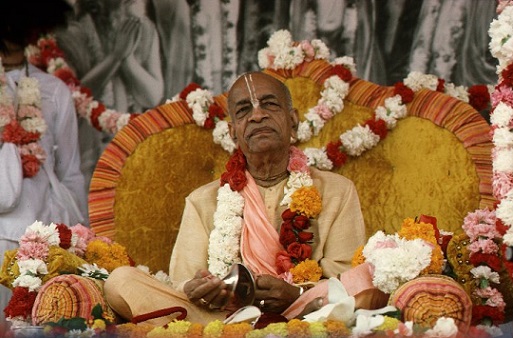(Click to enlarge photo of Srila Prabhupada)
"How you can purify your existence? That instruction is that mahat-sevāṁ dvāram āhur vimukteḥ (SB 5.5.2). If you associate and serve mahat—mahat means the great; great personality—mahat-sevāṁ dvāram, then your door for purification will be open. Mahat-sevāṁ dvāram āhur vimuktes tamo-dvāram... And the opposite is, if you want to enter into the darkest region of ignorance, then you associate with persons who are simply meant for sense gratification. That's all. Two ways: this way or that way. If you want to approach to the perfectional point of purificatory birth, then you associate with mahat-sevā. Sevā means service. Service. Our whole process is service. This spiritual life can be attained simply by service, not by any other qualification. Therefore in the Bhagavad-gītā the last instruction is surrender. You cannot render service to a person unless you surrender. That is the first condition, mahat-sevā.
Now, that surrender begins from mahat-sevā, surrendering unto a great personality. And who is great personality? That will be also explained. Generally, mahat means the great. Now, how a man can become great? When he is in contact with the great, supreme great. God is great. God is great, and if you contact God, then you become great. That is the definition given in the Bhagavad-gītā. There is no use of rubber-stamp great. That is not greatness. Greatness, that is explained in the Bhagavad-gītā. Oh, mahātmānas tu māṁ pārtha daivīṁ prakṛtim āśritāḥ (BG 9.13). Who are great? Mahātmās, great souls. Mahātmā, this title, cannot be given to any ordinary man. No. Mahātmā means... That is described very nicely, mahātmā. First..., first verse is, in the Bhagavad-gītā, that bahūnāṁ janmanām. Mahātmā, to become mahātmā, is not very easy thing. That is also explained in the Bhagavad-gītā. Bahūnāṁ janmanām ante (BG 7.19). After purifying the body, after many, many births, many, many births, bahūnām. Bahūnām means many. Many, many births purifying, trying to purify, trying to purify...
So bahūnāṁ janmanām ante jñānavān. Purification means full knowledge. What is the difference between dog and me? How I am purified? Because my knowledge is different than the dog. So purification means knowledge. Therefore the very word is used, jñānavān. Jñānavān, one who has advanced in knowledge, he is purified. Just like an ordinary man, he does not know how to keep hygienic principles; ignorant. But a person who knows the hygienic laws, how to keep the body, his body is purified due to knowledge. A man who does not know that 'By eating this such-and-such kind of food I'll be diseased,' he has no knowledge. Why so much..., so much disease in the society? Due to ignorance. Due to ignorance, a do... He goes to a man, a physician, who knows, who has the knowledge. Why do you go to the physician? Because you know that he has knowledge. He can give you direction how to keep body healthy. So nonpurification, impure body, means want of knowledge. Want of knowledge. So Bhagavad-gītā says, mahātmānas tu. Mahātmā. How one can become mahātmā? When he has got full knowledge. Then he has got purified body. Mahātmānas tu..., this very word is used, mahātmānas tu māṁ pārtha daivīṁ prakṛtim āśritāḥ (BG 9.13). One who has developed purified knowledge, purified body, he's no more under the control of this material world.
So mahātmānas tu māṁ pārtha (BG 9.13), those who have become great, the great souls, they are not under this material nature; they are in the spiritual nature. To become mahātmā means one should be under spiritual nature. After many, many births, when he has attained perfect knowledge, that is the sign of mahātmā. Mahātmānas tu māṁ pārtha daivīṁ prakṛtim āśritāḥ (BG 9.13). Who are great? Mahātmās, great souls. Mahātmā, this title, cannot be given to any ordinary man. No. And what is the test that he has attained purified knowledge and purified body? The test is… bahūnāṁ janmanām a..., after many, many births, bahūnāṁ janmanām ante jñānavān (BG 7.19). Who? One who has attained perfect knowledge. Jñānavān means perfect knowledge. Bahūnāṁ janmanām ante jñānavān māṁ prapadyate: 'He surrenders unto Me.' That is the ultimate standard of knowledge, when one has fully surrendered unto Kṛṣṇa, or God. That means he has attained perfect knowledge. You have got very good instance like Lord Jesus Christ. He fully surrendered unto God. Therefore he is so much worshiped. He is great. God is great. He is also great because he has fully surrendered. So this greatness means when you fully surrender unto the..." (break)
(Srila Prabhupada Lecture, Boston, April 28, 1969)
.
.
